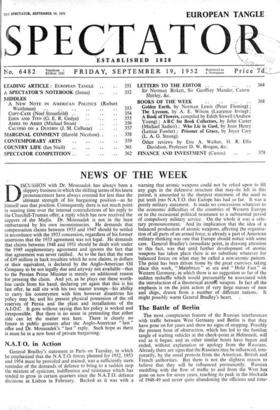N.A.T.O. in Action
General Bradley's statement in Paris on Tuesday, in which he emphasised that the N.A.T.O. forces planned for 1952, 1953 and 1954 must be provided and trained, was a sufficiently stern reminder of the demands of defence to bring to a sudden stop the Mixture of cynicism, indifference and resistance which has tended to grow in certain quarters since the N.A.T.O. defence decisions at Lisbon in February. Backed as it was with a warning that atomic weapons could not be relied upon to fill any gaps in the defensive structure that may-be left in this period, it amounted to the sharpest statement of the need to put teeth into N.A.T.O. that Europe has had so far. It was a purely military statement. It made no concessions whatever to the economic difficulties of the countries of Western Europe or to the occasional political resistance to a substantial period of compulsory military service. On the whole it was a salu- tary pronouncement. And its implication that the idea of a balanced production of atomic weapons, affecting the organisa- tion of all parts of an armed force, is already a part of American military thinking was one that Europe should notice with some care. General Bradley's immediate point, in drawing attention to this fact, was that until further development of atomic weapons has taken place there is no substitute whatever for balanced forces on what may be called a non-atomic pattern. The point has been driven home by the great exercises taking place this week, " Mainbrace " at sea and " Hold Fast " in Western Germany, in which there is no suggestion so far of the sudden reshuffle which would presumably be associated with the introduction of a theoretical atorrif weapon. In fact all the emphasis is on the joint action of very large masses of men and ships, drawn from a number of different nations. It might possibly warm General Bradley's heart.


































